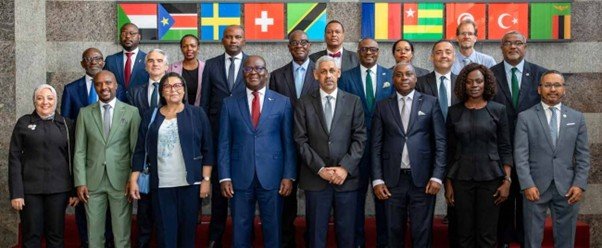
Development financing in Africa is at a critical juncture. The needs are substantial: infrastructure, renewable energy, industrial transformation, innovative SMEs, digital technologies, and social services. Yet the continent continues to face a chronic long-term financing gap, with often overstretched public institutions and insufficient external aid flows. It is in this context that the African Development Bank Group (AfDB) convened, on November 18–19, 2025, a series of unprecedented meetings in Abidjan with leading African stock market actors and financial institutions. The objective: to build a new continental financial architecture capable of mobilizing domestic savings, attracting institutional investors, and stimulating private equity for high-growth enterprises.
As architects of African capital markets, you are the guardians of financial institutions and the catalysts of our continent’s future
According to Sidi Ould Tah, AfDB President, “As architects of African capital markets, you are the guardians of financial institutions and the catalysts of our continent’s future.” His statement underlines the institution’s ambitious vision: to elevate capital markets from a marginal tool to a central pillar of African financing.

The meetings brought together over fifty representatives of regional and continental banks, private equity and venture capital funds, as well as stock exchanges from West Africa, Central Africa, Casablanca, Tunis, Rwanda, Mozambique, Cabo Verde, Nairobi, and Ghana. These actors, often dispersed and facing fragmented regulations, are now collaborating to discuss structural reforms aimed at strengthening market liquidity, broadening access to capital, and developing financial instruments tailored to African needs.
For Félix Edoh Kossi Amenounve, Director General of the BRVM, “There are gaps between financing needs and available resources, but we must consider the necessary reforms to capitalize African pension funds. These funds, originally created to finance governments, must now fund economic development.”
This reflection comes as SMEs account for nearly 90% of businesses and over 60% of employment in Africa, yet continue to face limited access to venture capital. Discussions therefore focused on promoting private equity and venture capital, creating better-structured regional funds, and adopting innovative financial instruments to support SMEs and emerging industrial champions.
By mobilizing patient capital, you provide our governments and businesses with diversified sources of financing
The role of stock markets extends beyond direct corporate financing. AfDB emphasizes three strategic pillars for their development: institutional and regulatory strengthening, diversification of actors and financial instruments, and training and policy dialogue to enhance the capabilities of market managers and regulators. According to Sidi Ould Tah, “Capital markets are the foundation on which sustainable and long-term economic growth rests. By mobilizing patient capital, you provide our governments and businesses with diversified sources of financing while offering institutional investors a broader range of opportunities.”
Digitization and fintech innovation have also been identified as crucial levers to increase market access and improve financial inclusion. Financial literacy, particularly among younger generations, is an integral part of this strategy, creating a pool of citizens and entrepreneurs capable of effectively engaging with modern financial instruments.
Regional coordination is essential to achieve scaling and policy harmonization
Regulatory challenges and regional coordination remain major obstacles. According to Donald Waweru Wangunyu, Non-Executive Director of the Nairobi Stock Exchange, “We have good projects, but obstacles remain. Regional coordination is essential to achieve scaling and policy harmonization.” Meanwhile, Sonia Ben Frej, Chairperson of the Board of the Tunis Stock Exchange, emphasizes the need to update outdated regulations to make markets more attractive to both local and foreign investors.
This initiative aligns with the AfDB’s Four Cardinal Priorities: increased access to predictable financing, capital market development, promotion of sustainable finance, and institutional capacity building. These principles aim to reduce Africa’s reliance on development aid and build a resilient, autonomous financial architecture.
The goal: create an environment where African capital markets become a strategic lever for development, job creation, and industrialization of the continent
By mobilizing domestic savings, attracting institutional investors, and structuring financial instruments adapted to the continent’s needs, AfDB seeks to transform African stock markets into true engines of growth. The two days of consultations in Abidjan are only the beginning of an ambitious process: creating an environment where African capital markets become a strategic lever for development, job creation, and industrialization.
As the meetings continue, it appears that Africa’s financial future could hinge on a combination of institutional reforms, dynamic private equity, digital technologies, and regional coordination. AfDB aims not only to catalyze these transformations but also to build them collectively with local and regional actors, ushering in a new era where African capital markets fully play their role in sustainable growth and development.





